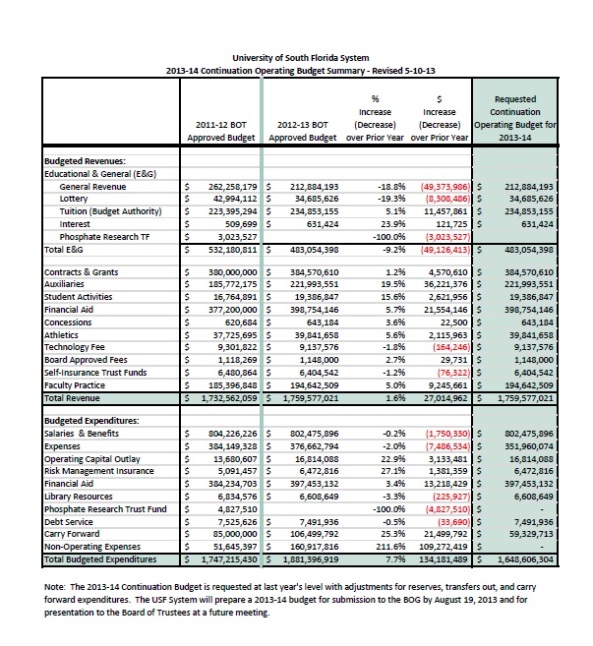One of the biggest takeaways that I’ve gained from Public Affairs Reporting as a whole is that public documents and information are an invaluable source in the world of journalism and news writing. When writing about budgets and where the money is coming from in governmental organizations, this fact still rings true.
Preston Trigg spoke to our class on Monday about government budgets and how to interpret them, and while I had worked with budgets in the past with my reporting experiences at USF, I had never thought of a budget so simply before his explanation:
“It’s basic: money coming in and money going out. It’s that simple. Don’t over complicate.”
I was a little surprised at first at how a document with a myraid of headings and numbers could be summed up in a sentence. Then I began to think about it, and he was right. I looked again at the USF continuing operating budget for the 2013-14 school year, the one I had used last summer when I was reporting on the Board of Governor’s meetings for The Oracle, and the one that became a vital resource for many of my stories in months to come.
It really was as simple as I had been told: money coming in, and money going out. The budget also lists where there are increases and decreases in spending compared to the previous budget, a tool that can really be used to a journalists’s advantage when looking for information for a story.
Another insight about budgets that Trigg shared that surprised me was that budgets are usually created based off of the previous year, with the numbers simple being adjusted. At first glance, they’re not going to look rapidly different or show and obvious changes, but by looking through the information and making comparisons, there is a great deal of information that can be utilized in a story. In order to find this information, journalists have to understand what is it they’re looking at.
The biggest takeaway that I had from Trigg’s lecture was that as a journalist, you can’t be afraid to ask questions about the budget and what it is you’re looking at. The biggest mistake you can make, Trigg said, is being wrong. You can prevent that from happening by asking the right questions to the right people, and it doesn’t always have to be to the decision makers.
Trigg advised students to talk to people who are involved with the budget process but who may not necessarily be the decision makers. If you’re just asking them background questions, they’re usually less apprehensive about giving you the answers you seek, and it also helps with source building if something major happens down the line. While writing future stories with budgets, I’m definitely going to keep this in mind, and I think it will make me less nervous working with budgets than I was previously.
